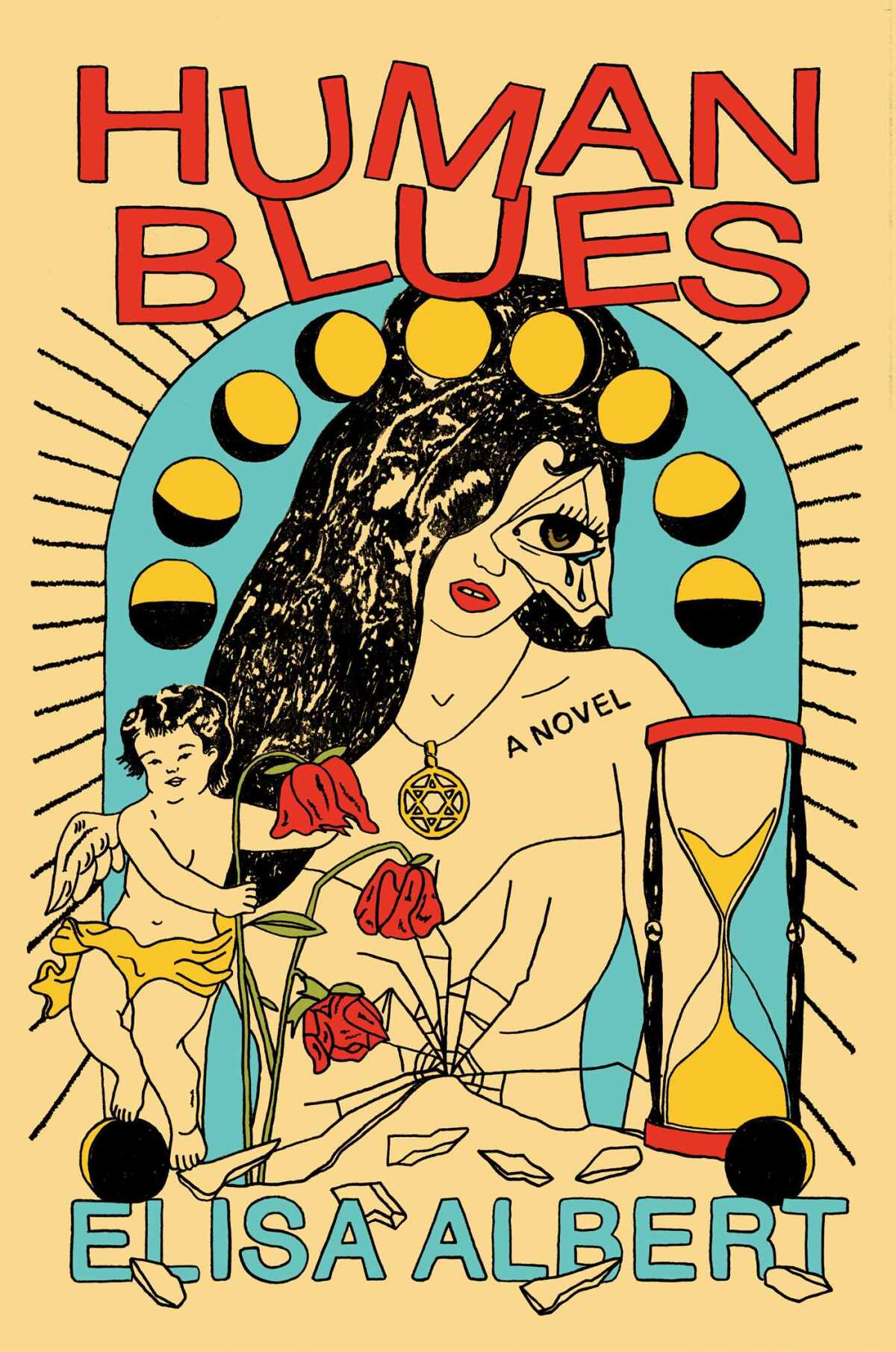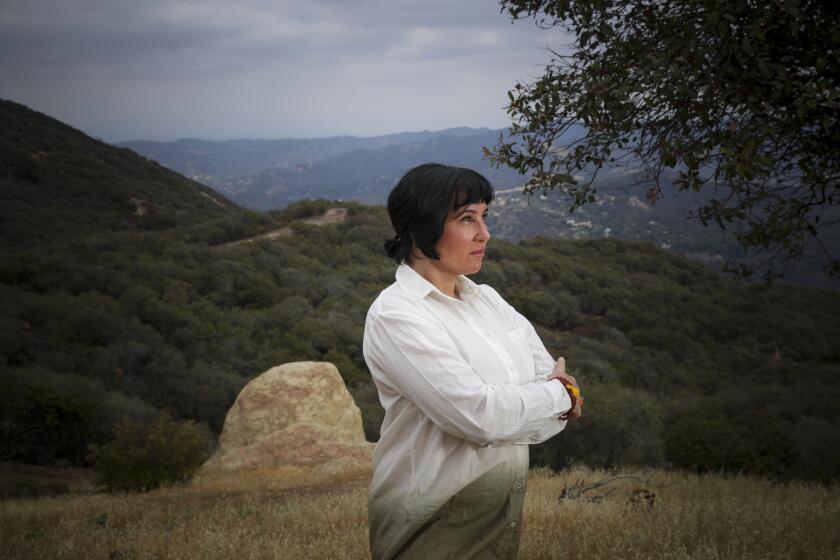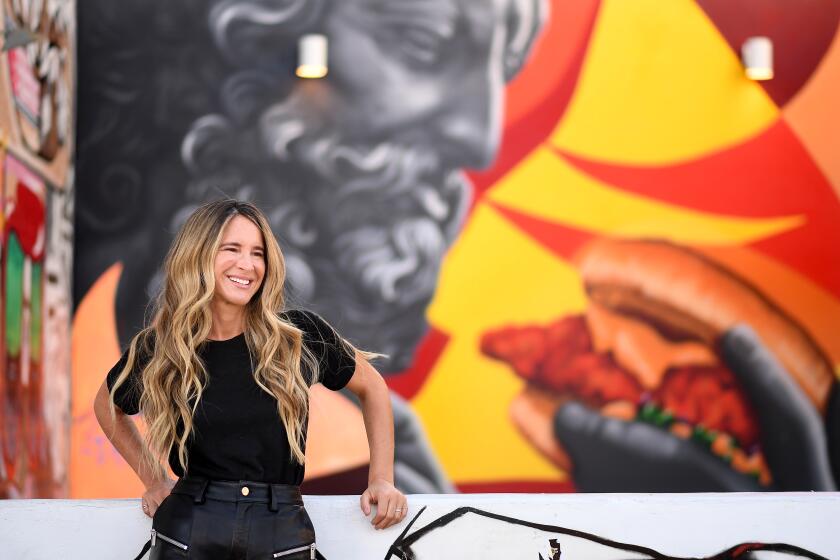A novelist explores sex, music and motherhood with a little help from Amy Winehouse

On the Shelf
Human Blues
By Elisa Albert
Avid Reader: 416 pages, $28
If you buy books linked on our site, The Times may earn a commission from Bookshop.org, whose fees support independent bookstores.
More than anything, Aviva Rosner wants a baby.
In âHuman Blues,â Elisa Albertâs fifth novel, the protagonist is trying âto reconcile where she comes from and what her own values are,â Albert says during a video interview. Aviva, a fierce and successful folk-rock singer brought up in Los Angeles, is married to a high-school history teacher in Albany, N.Y. The far-flung state capital is an unexpected stop on her lifeâs grand tour.
âHuman Bluesâ unfolds over a different kind of grand tour, through nine months of Avivaâs menstrual cycles, as she copes again and again with what she calls âthe bleed.â Aviva and Sam try and try and try to conceive a child the old-fashioned way. Many urge her to take different paths to parenthood, like artificial insemination, in vitro fertilization and adoption. But, Albert says, even though Aviva âis somebody who could get what she wants, she canât get past her own intuitive reality, doesnât want to override her belief that her baby should come into the world without forcing conception.â
Something about Avivaâs struggles with fame, musicianship and living in the world as a âgood girlâ reminded Albert of another musician: the gone-too-soon British singer Amy Winehouse. The title of âHuman Bluesâ comes from mix CDs Winehouse made for friends, so itâs fitting that the cover incorporates a kind of saintly iconography of Winehouse, with her trademark black bouffant hair, a Star of David pendant and the phases of the moon forming a halo.
âWe have enough penis rockets on the front page of the newspaper, donât we?â says Albert, when asked about the cover. âSo to show somebody who, when she was alive and making all of her ruinous mistakes, was not looked on with approval but then perished and was elevated to angelic martyr status? I needed to explore that. Not in admiration of her path or her choices, but because she refused to play by anybody elseâs rules. And that made her artistically profoundly important.â
âGhost Lover,â the first story collection by âAnimalâ and âThree Womenâ author Lisa Taddeo, features more women warped by the male gaze.
Aviva is entangled with the historical Winehouse and so, on a different level, is Albert, who actually met Winehouseâs âmumâ and stepfather in England while on a residency. âI reached out to Janice Winehouse, just as Aviva does in the book. Janice makes it really clear she doesnât want to talk to journalists. Luckily, Iâm not one!â Albert laughs. âShe and her husband are totally OK to go have coffee with anyone they deem a true fan. Itâs like the longest continuously running shiva where we all love and value and mourn the same person.â
Aviva and her creator, have another Winehouse fixation in common: For both Amyâs Jewishness is paramount.
âShe was really one of us, and we donât see that too often,â Albert says. âBut if she didnât have the goods, it wouldnât matter. What Iâm writing about in âHuman Bluesâ is authenticity. Itâs about doing the work. The work is hard. The work is not always rewarding. In fact, the work is not rewarding. The rewards come later, you know what I mean?â
Albert took seven years to write the novel, she says, dropping an F-bomb to emphasize how hard she worked. âWe had to cut at least 100 pages. But this kind of work should be where weâre allowed to just go to crazy places and then rein it back in and find the equilibrium.â

Avivaâs long, smart, funny rants about menstruation, infertility, bodily functions and sex in its many guises are carefully constructed; through them, Albert wants to break down the walls of ignorance that surround birthing bodies. âItâs shocking to me that we arenât raised with much more knowledge about these things, whether itâs attaining pregnancy, avoiding pregnancy, attending to our own energy levels. ⌠Itâs so primal and important.â Once sheâd given birth, Albert became a part-time doula and learned about her own monthly cycles âso that I could accommodate myself and make life a little bit easier for myself and my loved ones.â
The end of Avivaâs story is only one of the novelâs surprises. She resists and gives in to many different kinds of temptation through these nine cycles. But one of the most powerful drugs she has to decide whether to take is pure, uncut sexual desire â Avivaâs are among the wettest panties of literature. Albert laughs long and hard hearing that, but she also takes it seriously. âBecause female sexuality is horrifically dangerous and threatens the status quo and all systems would crumble if women knew our power!â she says.
Albert mentions an essay she wrote for an upcoming anthology thatâs partly about the Jewish laws of purity, including the mandate that women live separately during menstruation. Such customs âget a bad rap,â she says. âPeople think itâs about deeming women unclean, whereas itâs more about an enlightened view of humans who cycle and bear children, about seeing their innate holiness.â
The poet, viral tweeter and author has a new novel, âMilk Fed,â imagining an explicit affair between a damaged Hollywood loner and a plus-size woman.
The essay â and her new novel â led Albert to ponder her own maternity.
âWhen I had a child at 30, for my social circle it was like a teen pregnancy. Among my peers, I might as well have been 15. It was unsettling,â she says. âBut then, once you have a baby, especially in the community that I come from in California, it became: âWhen are you having another?â If you exist in one of these bodies, youâre never done. Youâre never good enough. Youâre never mom enough. Youâre never anything enough.
âThere should be a fairness to living in a particular kind of body, but there isnât. Some of us are going to suffer, some of us will die too young, itâs not fair but here we are.â
Albert speaks from the Albany home where she lives with her spouse, their son and a recently acquired mutt. While she still lives a Jewish life, Albert follows her own ideas about faith. âWeâre all struggling as a species, you know?â she says. âWhat do we want to take with us from the past as we reinvent the world day by day? We actually do still need certain kinds of rituals, traditions and rootedness. Itâs a constant personal and collective struggle.â
Even though weâd like to keep talking about fiction, fertility and âHuman Blues,â the time is soccer-mom-oâclock. I joke that Albertâs son, who recently celebrated his bar mitzvah, must be thinking, âToday I am a man, but my mother better get me to practice on time.â
âAbsolutely. Like, âMom is the best chauffeur,ââ she says. âThereâs always going to be stuff you donât choose in life, but the question has become, for me, âhow do you make a beautiful life anyway?ââ
A guide to the literary geography of Los Angeles: A comprehensive bookstore map, writersâ meetups, place histories, an author survey, essays and more.
More to Read
Sign up for our Book Club newsletter
Get the latest news, events and more from the Los Angeles Times Book Club, and help us get L.A. reading and talking.
You may occasionally receive promotional content from the Los Angeles Times.











